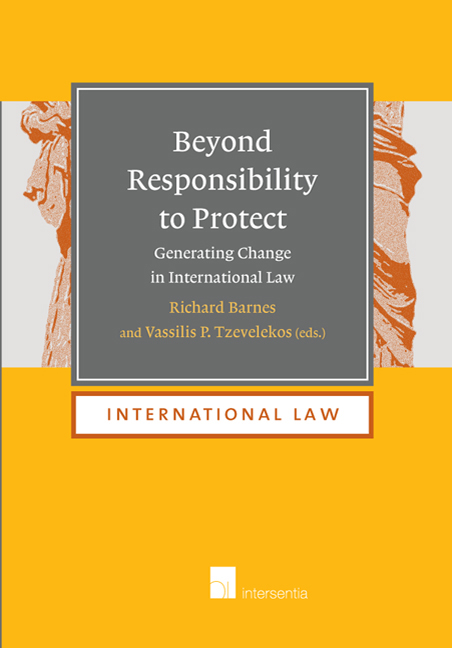Book contents
- Frontmatter
- Dedication
- Foreword
- Acknowledgements
- Contents
- Table of Cases
- List of Authors
- Introduction
- Part I The Moral Underpinnings and Political Ends of R2p
- Part II International Institutions And Their Role In R2p
- PART III De Facto Regimes and Non-State Actors Within a State And as a State
- Part IV R2p and Due Dilligence Regarding the Conduct of Corporations
- On the Responsibility to Protect and the Business and Human Rights Agenda
- Tides of Change – The State, Business and the Human
- Commentary: The Responsibility to Protect and Non-State (Corporate) Actors – More of the Same?
- Part V The Interaction Between R2p And Humanitarian Law Obligations To Protect Civilian Populations
- PART VI R2p and International Criminal Law Beyond the Four R2p Crimes
- Part VII R2p and its Possible Impact on the Law of International Responsibility
- Part VIII Concluding Observations
- Index
Commentary: The Responsibility to Protect and Non-State (Corporate) Actors – More of the Same?
from Part IV - R2p and Due Dilligence Regarding the Conduct of Corporations
Published online by Cambridge University Press: 19 September 2018
- Frontmatter
- Dedication
- Foreword
- Acknowledgements
- Contents
- Table of Cases
- List of Authors
- Introduction
- Part I The Moral Underpinnings and Political Ends of R2p
- Part II International Institutions And Their Role In R2p
- PART III De Facto Regimes and Non-State Actors Within a State And as a State
- Part IV R2p and Due Dilligence Regarding the Conduct of Corporations
- On the Responsibility to Protect and the Business and Human Rights Agenda
- Tides of Change – The State, Business and the Human
- Commentary: The Responsibility to Protect and Non-State (Corporate) Actors – More of the Same?
- Part V The Interaction Between R2p And Humanitarian Law Obligations To Protect Civilian Populations
- PART VI R2p and International Criminal Law Beyond the Four R2p Crimes
- Part VII R2p and its Possible Impact on the Law of International Responsibility
- Part VIII Concluding Observations
- Index
Summary
INTRODUCTION
Responsibility to protect (R2P) is an incredibly powerful and fashionable notion in contemporary international legal discourse. While it is not my intention to flesh out the pervasiveness of this discourse and its potentials and pitfalls, a job that is much better done by other contributors to this volume and others elsewhere, it is worth reminding ourselves of the gravitational pull of R2P. This gravitational pull means in effect that many other ideas want to hitch themselves to the R2P comet as a means to reach new audiences, gain more prominence in legal debate, or even be revived. Conversely, as others in this volume have noted, R2P also relies on other ideas to establish its own credibility as a candidate for full legal normativity. So, if R2P is a concept one may want to latch onto for its prominence and appeal politically and rhetorically, it needs other concepts to establish its own credibility as a legal norm.
The responsibility of non-state actors is one notion that seemingly could hitch itself to the R2P comet. The majority of the debate around R2P, and certainly its origins, have to do with the duties of states towards their own citizens, and then subsidiary duties of the ‘international community’ (however defined) to step in. Therefore, it would seem unlikely at first glance that the concept of R2P would also apply to the duties of non-state corporate actors vis-à-vis human rights. Yet that is the basic premise behind the contributions of Cantú Rivera and McCall- Smith, on which this note is primarily a comment.
In the paragraphs that follow, this note will explore the arguments in these two contributions and frame them in the broader context of R2P's contribution to broader normative change in international law. In order to get there, first I will explore what I consider to be the problem with R2P being transplanted into the corporate context; next, I will reflect on what, if anything, due diligence adds to the R2P debate. The following section considers the reverse side of that coin – what, if anything, R2P contributes to broader discussions on due diligence and human rights obligations of non-state actors.
- Type
- Chapter
- Information
- Beyond Responsibility to ProtectGenerating Change in International Law, pp. 241 - 248Publisher: IntersentiaPrint publication year: 2016



